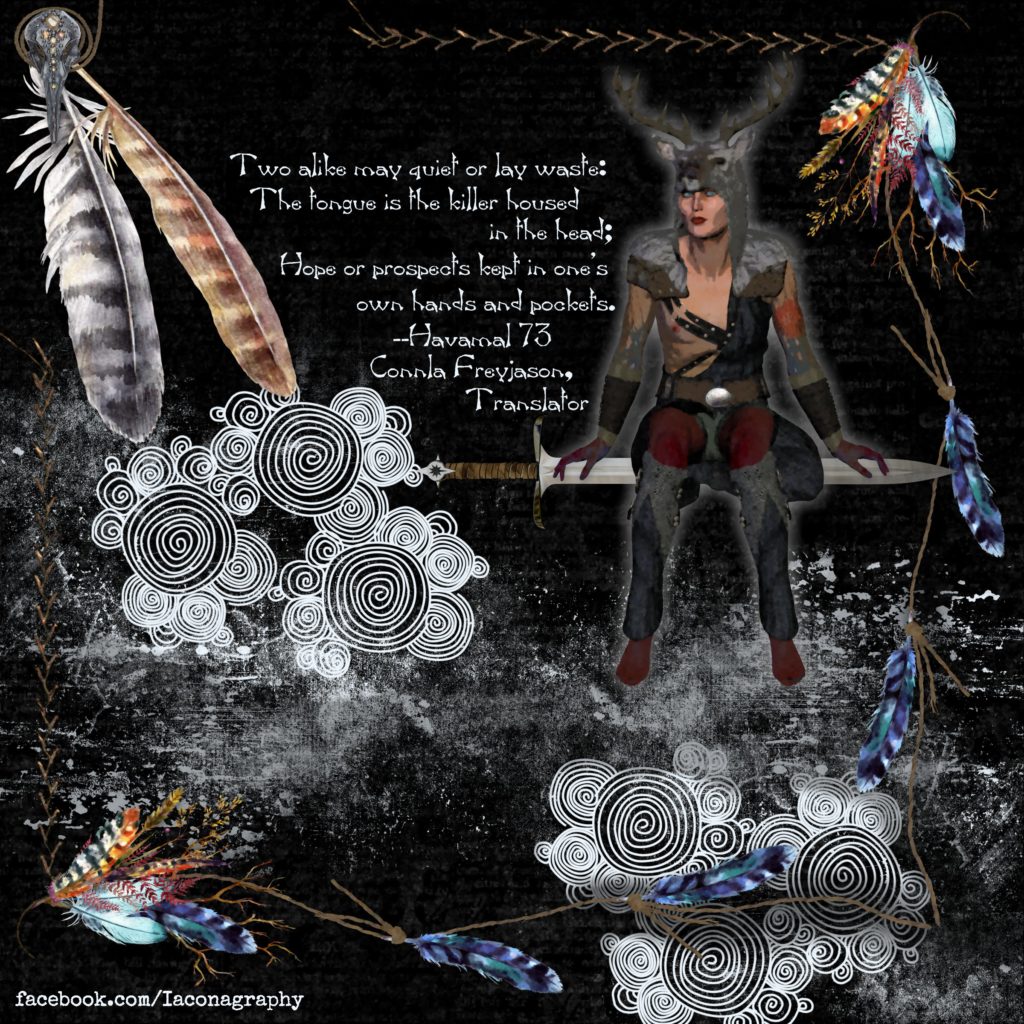Put Down Your Seax And Pick Up Your Heart: The Real Meaning of a Warrior Mentality (Part Three)

Two alike may quiet or lay waste:
The tongue is the killer (housed) in the head;
Hope or prospects kept in one’s own hands and pockets.–Havamal 73, Translation Mine
In the last two blog posts, we explored how mindfulness and determination form the foundation of a true modern warrior mentality. Today, we put that foundation to work, as we explore the third key: self-control coupled with selflessness.
Most people are more familiar with this translation of Havamal 73:
Two make a battle,
the tongue slays the head;
In each furry coat a fist I look for.
Unfortunately, while that translation is popular, it’s not exactly correct. Even more unfortunate is the way in which many “would-be warriors” employ this over-generalized “poetic” translation to justify behaving like bullies. Let’s look at this translation side-by-side with my own literal translation:
| Traditional Translation | Implication | Literal Translation | Implication |
| Two make a battle | People naturally fight | Two alike may quiet or lay waste | Two things can either cause peace or cause trouble |
| The tongue slays the head | Thoughtless words hurt people | The tongue is the killer housed in the head | Thoughtless words hurt people |
| In each furry coat a fist I look for | I naturally expect violence from the other person all the time | Hope or prospects kept in one’s own hands and pockets | Keeping hopes and prospects for one’s self, instead of giving them to the community |
As you can hopefully see from the table above, what this passage is actually talking about is practicing self-control coupled with selflessness.
Attitude is everything. We can either choose to go at life looking for the worst in people and expecting violence at every turn, or we can realize that every action has an equal and opposite reaction. Life is full of choices: we can make the decision to bring more peace into the world, or we can make the decision to birth more trouble. When we go at life negatively, that choice has already been made for us. Violence begets violence; trouble begets yet more trouble. Those who go at life in such a negative fashion then sit around and wonder why life sucks. Shouldn’t “staying on top of things” and being a ready opponent naturally lead to power and control? Actual warriors understand that combat has an ebb and flow, which demands sometimes being the opponent, and sometimes being the defender. The best evidence that one is not a true warrior is a lack of that understanding.
Words can help, or words can harm. Think before you speak:
Is it True?
Is it Helpful?
Is it Inspiring?
Is it Necessary?
Is it Kind?
The tongue is the most dangerous weapon we humans have at our disposal. Harsh words can spark harsh blows; it’s only a matter of time before words spoken in anger or hatred lead to physical altercations. Even the Christian Bible speaks on this:
A word out of your mouth may seem of no account, but it can accomplish nearly anything–or destroy it! It only takes a spark, remember, to set off a forest fire. A careless or wrongly placed word out of your mouth can do that. By our speech we can ruin the world, turn harmony to chaos, throw mud on a reputation, send the whole world up in smoke and go up in smoke with it, smoke right from the pit of evil. This is scary: you can tame a tiger, but you can’t tame a tongue–it’s never been done. The tongue runs wild, a wanton killer. With our tongues, we bless the Gods; with the same tongues we curse the very men and women the Gods made. Curses and blessings out of the same mouth! –James 3:5-10, Paganized paraphrase of The Message Translation
A true warrior practices tongue control, and through it, self-control. Whether we like it or not, the Bible did inform our Ancestors, and it can also inform us on tongue control:
Do you want to be counted wise, to build a reputation for wisdom? Here’s what you do: Live well, live wisely, live humbly….Mean-spirited ambition isn’t wisdom. Boasting that you are wise isn’t wisdom. Twisting the truth to make yourselves sound wise isn’t wisdom. It’s the furthest thing from wisdom–it’s animal cunning, evil conniving. Whenever you’re trying to look better than others or get the better of others, things fall apart and everyone ends up at each other’s throats.
Real wisdom begins with a righteous life and is characterized by getting along with others. It is gentle and reasonable, overflowing with mercy and blessings, not hot one day and cold the next, not two-faced. You can develop a healthy, robust community that lives right and enjoys its results only if you do the hard work of getting along with each other, treating each other with dignity and honor.
–James 3:13-18, Paganized paraphrase of The Message Translation
Notice the emphasis on reputation, dignity, and honor in that paraphrase. The hamingja is understood as one of the parts of the “Norse soul”; it is also one’s reputation or legacy. The next time your tongue threatens to lose control, perhaps it might be prudent to ask yourself: “Is throwing shade worth damaging part of my soul?” We may wish to genuinely damage the other person involved, but most of us draw the line at harming ourselves!
Expectation governs reaction. When we allow ourselves to go through life constantly looking over our shoulder for whatever dangers might be lurking (and perhaps even checking people’s pockets for weapons), we set ourselves up for trouble. We create an environment in which unpleasantness becomes virtually unavoidable. However, when we instead go through life with hopeful expectancy, as discussed in my last blog series, our entire perspective changes. Ours is a Tradition that celebrates a gift for a gift; how much better might our lives be, if we lived them that way, rather than exchanging blow for blow? The blow for blow mentality sets up a sort of “Pavlov’s response”, wherein we naturally seek to be stronger, tougher, and more mercenary than our opponent, and in the end, everybody winds up becoming an opponent.
Giving leads to receiving, and vice versa. This can apply to gifts, or this can apply to blows. Which would you prefer?
We can hold our hopes and our finances close, and become miserly dragons, like Fafnir, or we can take a lesson from that tale, and spread the wealth. The greedy and the self-serving never get very far in Norse Lore, nor any lore for that matter. Perhaps there’s a reason for that? Maybe that reason is because certain things are simply true across cultures, and across time:
I never found a kind person or so goodly a feast,
That it has not been accepted hospitably,
Neither money
Nor yet greed is a road to reward, if you please.–Havamal 39, Translation Mine
Greed never leads to reward, but kindness and selflessness are a type of heroism all their own. And this isn’t just about money; no, what I’m referring to here is charity:
charity: generosity and helpfulness especially toward those who are needy or suffering; aid given to those in need; benevolent good will toward or love of humanity.
As I’ve said previously, the true warrior does not solely act from a place of offense, but likewise (perhaps even more often) from a place of defense. Sometimes, the easiest way to defend those in need is to give: to be generous with your heart, as well as with your pocketbook; to speak up for the helpless; to look around, find where you are most needed, and then be fully there.
Self-control coupled with selflessness ultimately leads to a focus on, and focus in community. That will be the topic of the final blog post in this series:
Put Down Your Seax And Pick Up Your Heart: The Real Meaning of a Warrior Mentality (Part Four)


